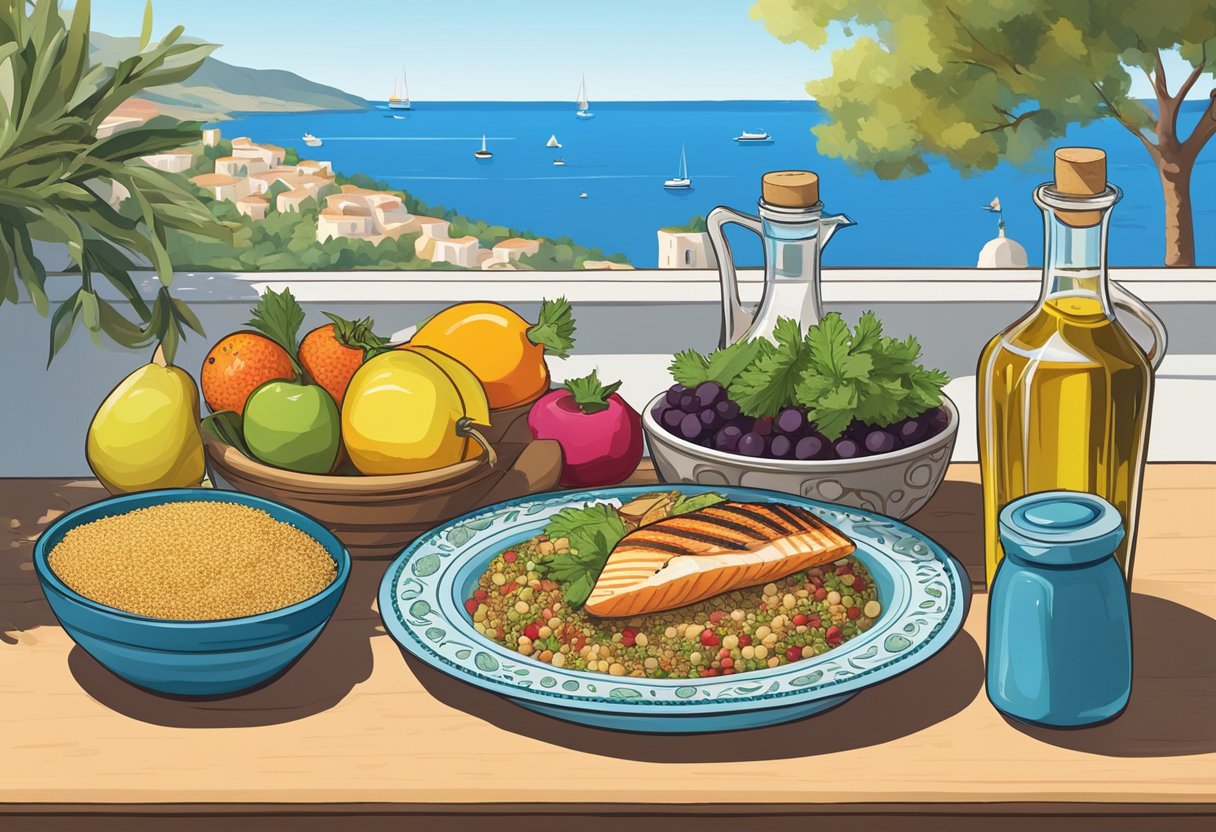The Mediterranean diet, lauded for its numerous health benefits, emphasizes whole foods—fruits, vegetables, whole grains, legumes, nuts, and seeds, along with a high intake of olive oil. Coupled with a gluten-free approach, this diet becomes an even more inclusive option that accommodates those with gluten sensitivities or celiac disease. Rich in antioxidants, the gluten-free Mediterranean diet supports overall well-being by incorporating functional foods that combat inflammation and promote health.

Understanding the critical role of antioxidants in the diet is essential. These compounds, prevalent in a variety of Mediterranean staples, protect the body’s cells from oxidative stress, which can lead to chronic diseases. Antioxidants are found abundantly in foods like fruits, vegetables, nuts, and olive oil—an integral part of the Mediterranean diet. This synergy of a gluten-free lifestyle with the antioxidant-packed Mediterranean diet offers a strategic approach to improve health outcomes while enjoying flavorful and diverse meals.
Key Takeaways
- A gluten-free Mediterranean diet includes a variety of antioxidant-rich foods that promote health.
- This diet merges the benefits of Mediterranean eating patterns with the needs of those avoiding gluten.
- It represents a lifestyle that supports long-term health through a balanced, nutrient-dense, and diverse diet.
Table of Contents
Fundamentals of the Gluten-Free Mediterranean Diet
The Gluten-Free Mediterranean Diet fuses traditional Mediterranean eating habits with the needs of individuals avoiding gluten, focusing on high-quality, nutrient-dense foods for optimal health.
Defining the Gluten-Free Mediterranean Diet
The Gluten-Free Mediterranean Diet is characterized by a high intake of vegetables, fruits, whole grains, legumes, nuts, seeds, and healthy fats such as olive oil. It excludes all sources of gluten to cater to those with celiac disease or gluten sensitivity.
Health Benefits of the Mediterranean Lifestyle
Following a Mediterranean diet can offer numerous health benefits, including reduced risk of heart disease and other chronic conditions. Its anti-inflammatory properties contribute to better mental health and general well-being.
Key Components of the Diet
The diet’s cornerstones are plant-based foods: vegetables, fruits, legumes, and whole grains. It emphasizes healthy fats, primarily olive oil, and includes moderate amounts of lean protein from fish and poultry.
Understanding Gluten and Appropriate Food Choices
People with celiac disease or gluten sensitivity must avoid gluten, found in wheat, barley, and rye. Safe choices include naturally gluten-free grains, such as quinoa and rice.
Balancing Macronutrients and Micronutrients
The diet balances macronutrients – carbohydrates from fruits and vegetables, protein from legumes and seafood, and fats primarily from olive oil – along with essential micronutrients, like the fiber and antioxidants found in fresh produce and whole grains.
Navigating Common Challenges and Solutions
Avoiding cross-contamination with gluten is essential for people with celiac disease. This involves careful label reading and strategies for eating out to maintain a gluten-free diet.
Antioxidant-Rich Foods within the Diet
A gluten-free Mediterranean Diet emphasizes a variety of antioxidant-rich foods to combat oxidative stress and may reduce the risk of chronic diseases such as cancer.
Fruits and Vegetables as Antioxidant Powerhouses
Fruits and vegetables are essential in the gluten-free Mediterranean diet, offering a diverse range of antioxidants. Kale, blueberries, and orange vegetables like carrots and bell peppers are particularly high in antioxidant content. For instance, blueberries are lauded for their high levels of vitamin C and flavonoids.
Incorporating Healthy Fats
Healthy fats, crucial for absorbing fat-soluble antioxidants, are abundant in olive oil, nuts, seeds, and avocado. The diet includes these foods not only for their heart-healthy fats but also for their ability to enhance the absorption of antioxidants. Specifically, omega-3 fatty acids found in fish play a pivotal role in reducing inflammation.
Selecting Protein Sources
Protein in the gluten-free Mediterranean diet comes predominantly from fish like salmon and poultry, as well as from eggs and legumes. Salmon, a preferred option, is a good source of both protein and antioxidants. Legumes, including chickpeas, beans, and lentils, also offer a boost of antioxidants along with plant-based proteins.
Herbs and Spices to Enhance Antioxidant Intake
Adding flavour and nutritional value, herbs and spices such as garlic, rosemary, oregano, and cinnamon, are rich in antioxidants. These can easily be included in dishes for not just their taste but also their health benefits.
Choosing Gluten-Free Whole Grains and Legumes
Gluten-free grains like quinoa and brown rice are included in the diet along with a variety of beans and lentils. These not only serve as antioxidant-rich alternatives to traditional gluten-containing grains but also provide dietary fiber.
Importance of Hydration and Antioxidant Beverages
Proper hydration is fundamental, and the diet encourages consuming plenty of water, along with antioxidant-rich beverages such as tea, coffee, and, in moderation, red wine. These beverages can help to further increase the intake of antioxidants.
Practical Aspects of the Diet

Adopting the gluten-free Mediterranean diet involves incorporating a variety of antioxidant-rich foods while ensuring meals are balanced and enjoyable. This section provides practical tips on meal planning, recipe ideas, smart snacking, gluten-free substitutions, and shopping guidance to help you maintain this nutritious lifestyle.
Creating a Balanced Meal Plan
A balanced meal plan on this diet emphasizes vegetables, fruits, whole grains like quinoa, lean proteins such as chicken, and healthy fats from sources like nuts and olive oil. Breakfast might include Greek yogurt with nuts and fruit, while lunch and dinner could showcase hearty salads with lemon vinaigrette, quinoa as a grain substitute, and entrees featuring tomato-based sauces rich in antioxidants.
Recipe Ideas and Meal Inspiration
Integrating this diet into daily life can be delicious and simple. For inspiration, Mediterranean Gluten-Free Diet guidelines suggest including traditional recipes like hummus made from legumes, high in antioxidants, and using herbs and spices to add flavor without gluten. Lemon-garlic chicken is another classic, pairing well with assorted grilled vegetables.
Snacking Strategies with Antioxidant Benefits
Smart snacking on this diet is about choosing foods that offer antioxidant benefits, like nuts and seeds. Cheese and yogurt can serve as nutritious gluten-free and dairy-rich or dairy-alternative options while steering clear of processed snacks. Homemade trail mix or sliced tomatoes with a drizzle of olive oil are perfect examples.
Gluten-Free Substitutions in Cooking and Baking
Cooking and baking gluten-free requires some adjustments. Swap out traditional flour for almond or chickpea flour, and use natural sweeteners like honey instead of processed sweeteners. Dairy products can also be substituted with dairy alternatives such as almond or coconut milk for those who prefer or need non-dairy options.
Shopping Tips and Reading Labels
When shopping for ingredients, reading labels becomes crucial. Look for certified gluten-free labels to avoid cross-contamination. Anti-Inflammatory, Gluten-Free, Mediterranean Meal Plan advocates choosing whole foods over processed items and suggests stocking up on seasonal produce for the freshest flavors and highest nutritional content.
Lifestyle Integration
Integrating the antioxidant-rich, gluten-free Mediterranean diet into one’s lifestyle requires attention to daily habits and community. A holistic approach ensures that exercise and mental health are not overlooked in favor of diet alone.
Physical Activity and Stress Reduction Strategies
Regular exercise is a cornerstone of the Mediterranean lifestyle, promoting cardiovascular health and helping to manage chronic diseases. Finding activities that are enjoyable ensures better diet adherence, and even light activities, such as walking or gardening, can be significant. To complement physical wellness, stress reduction strategies like mindfulness and yoga address mental health, acting synergistically with diet to optimize health.
Building a Supportive Community
Social support is essential; many find success by engaging with communities who share their dietary goals and cultural aspects of the Mediterranean lifestyle. Whether through cooking groups or online forums, these communities offer motivation, recipes, and tips for navigating challenges. This network also acts as a filter against misinformation, fostering a knowledge base grounded in scientific research.
Ongoing Research and Pitfalls to Avoid
Continuous dedication to scientific research is key in understanding how the gluten-free Mediterranean diet affects health, given ongoing debates and findings. Keeping abreast of new studies helps in separating fact from misinformation, crucial in a world brimming with dietary fads. Individuals should be cognizant of pitfalls such as nutrient deficiencies and ensure a well-balanced intake of fruits, vegetables, whole grains, healthy fats, and lean proteins.
Health Impact and Preventive Aspect

The integration of a gluten-free Mediterranean diet enriched with antioxidants is poised to offer considerable health benefits and serve as a preventive strategy against various chronic diseases. This dietary approach focuses on nutrient-dense, whole foods which play a crucial role in promoting overall wellness.
Role in Disease Prevention and Management
A gluten-free Mediterranean diet is replete with fruits, vegetables, nuts, seeds, and legumes, all of which are sources of antioxidants such as vitamin C, E, and various phytochemicals. These antioxidants are significant in maintaining heart health by reducing oxidative stress and inflammation, key mechanisms in the development of atherosclerosis. Studies suggest that regular consumption of these antioxidant-rich foods may lead to lower blood pressure and improved cholesterol levels, which are important factors in preventing and managing type 2 diabetes and heart disease.
Cognitive and Mental Health Benefits
The omega-3 fatty acids, polyphenols, and vitamins found in the Mediterranean diet are associated with a lower risk of cognitive decline and may support overall brain health. Consuming a diet rich in these nutrients has been correlated with enhanced memory and executive function. Furthermore, Mediterranean dietary patterns may also confer protective effects against depression due to their anti-inflammatory properties, contributing to mental wellness and resilience.
Influence on Digestive Health and Immune System
Emphasizing naturally gluten-free grains such as quinoa and rice, this diet supports gut health by fostering a healthy microbiota, thus potentially reducing the risk of inflammation-related intestinal conditions. The gluten-free aspect of the diet is crucial for individuals with celiac disease or gluten sensitivities, as it prevents the immune-related damage to the gut lining. A balanced gut flora not only improves digestion but also strengthens the immune system, as a significant portion of the immune cells reside in the gut. This can provide a level of protection against various immune-related conditions and infections.
Frequently Asked Questions
Adapting the Mediterranean diet to a gluten-free lifestyle is straightforward with a focus on naturally gluten-free and antioxidant-rich foods. Here are some common questions to help maintain the health benefits of the diet while ensuring it meets dietary restrictions.
How can I adapt a Mediterranean diet meal plan to be gluten-free?
One can adapt their meal plan by replacing traditional gluten-containing grains with alternatives like quinoa, brown rice, and gluten-free oats. It’s essential to ensure that all grains and processed foods are certified gluten-free to avoid cross-contamination.
What are some staple ingredients of a gluten-free Mediterranean diet?
Staple ingredients include fresh fruits and vegetables, legumes, nuts, seeds, olive oil, and fresh sea-food. These items do not naturally contain gluten and are central to the diet.
Can you recommend gluten-free antioxidant-rich foods commonly found in the Mediterranean diet?
Antioxidant-rich foods that are gluten-free and common in the Mediterranean diet include berries, leafy greens, olives, and nuts. Fruits like grapes and citrus are also abundant sources of antioxidants.
What are some gluten-free breakfast options that fit within the Mediterranean diet guidelines?
For breakfast, one might enjoy a bowl of Greek yogurt with honey and walnuts, or a gluten-free oatmeal topped with fruits. These options provide a healthy start that aligns with the Mediterranean diet principles.
Where can I find recipes for gluten-free and dairy-free Mediterranean diet dishes?
Recipes can be discovered on websites specializing in gluten-free living or through resources provided by gluten-free Mediterranean diet experts. These sites offer a variety of meal ideas that cater to these specific dietary needs.
How can the Mediterranean diet support good gut health while also being gluten-free?
The diet supports gut health through a high intake of fiber from fruits, vegetables, and legumes, which fosters a healthy gut microbiome. Incorporating gluten-free whole grains and probiotic-rich foods like kefir also promotes digestive wellness, consistent with Mediterranean eating patterns.



